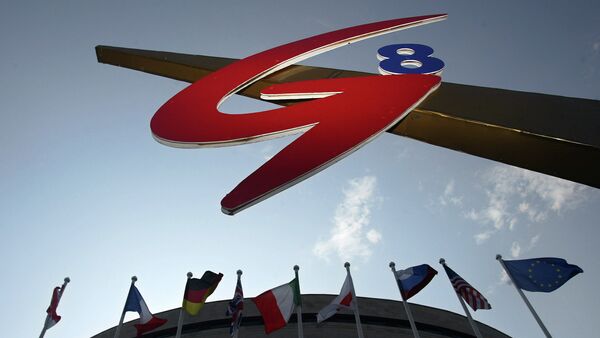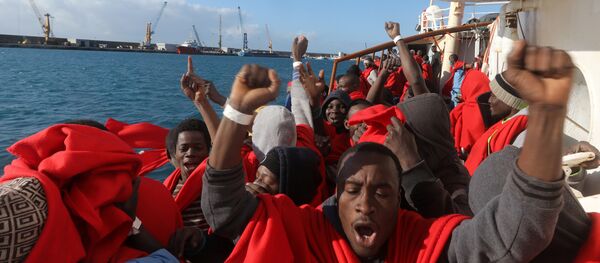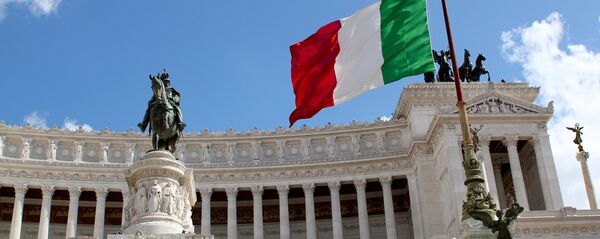Italy assumed the group's rotating presidency on January 1, and will host the next G7 summit in Taormina, Sicily, in May.
Earlier this month, Italian Foreign Minister Angelino Alfano said that his country would like to see Russia at future summits in order to discuss co-operation on pressing political and economic issues.
"We discuss with Russia all the most delicate international crises. This is the truth. Perhaps it won't be possible for Taormina, but in the future we should consider returning to a G8 that replaces the current G7," Alfano told parliament on January 17.
Tiberio Graziani, President of the Rome-based Institute for Geopolitical Studies and Auxiliary Sciences (IsAG) told Sputnik Italia that Italy's desire to return Russia to the G7 is a continuation of Rome's long-term foreign policy.
"Recent statements by Italian Foreign Minister Angelino Alfano on the need to return to Russia to the G8 format show the long-term bilateral relationship between Italy and Russia," Graziani said.
In October some EU members, including France, Germany and the UK, pushed for more sanctions against Russia, blaming Moscow for the deterioration of the humanitarian situation in the besieged Syrian city of Aleppo.
"Today Italy is urging steps to address the issue of lifting sanctions. I believe that the first step is to start negotiations about their abolition. However, both within the EU and the US there are a lot of opponents to taking relations with Russia to a new level. There are people in the establishment who are going to try to resist Trump and continue Obama's policies."
"The same thing is happening in the EU, where there is now a lot of political groups opposed to the lifting of sanctions. However, I am sure that if Italy continues to stand up for Russia, in the future we will be able to return a balance to relations between Russia and the EU."
"The situation with sanctions is actually very complex, it is not limited to the desire of Trump and Italy to abolish them. The whole situation has been portrayed in the media in a simplistic way, so a lot of people expected the immediate lifting of sanctions after Trump's inauguration. However, it's not that simple, because, as I already mentioned, both in the US and in the EU, there are factions opposed to the Trump administration and Russia. You have to take this into account and not expect the immediate lifting of sanctions, but I still believe that common sense will prevail and the parties will sit down at the negotiating table," Graziani said.
Graziani said that Italy's desire to act as a mediator in returning Russia to the G7 is also an effort to increase its weight in the international arena.
"In 2017 Italy will become a platform for various international high-level meetings. This gives the opportunity to increase its weight in the international arena. If Italy continues to advocate for the normalization of relations with Russia, that could bring mutual benefit for Italy and Russia. Italy gains international prestige, and at the same time its economy and foreign trade benefits. It has long been clear that good relations between Italy and Russia are beneficial to both economies."
The first G6 summit took place in Rambouillet, France, in 1975. Canada joined the organization the following year, and Russia was part of the G8 between 1998 and 2014.
Since then Russia has shown little interest in rejoining the organization, since Moscow sees the Group of 20 major economies as a more relevant forum for discussing international co-operation.
In June 2015 Russian President Vladimir Putin remarked that Russia's former involvement in the G8 had given its members a chance to listen to a different point of view.
"I thought that there was some point (to Russia's membership), because at least we offered some kind of alternative point of view. But our partners have decided that they don't need an alternative point of view. That's their decision. But it (the G7) is not an organization. It's a club of interests. We wish the format success," Putin said.
In June last year Russian Foreign Minister Sergey Lavrov said that Russia is not preparing to return to the G7.
Russia's Western partners "are already persuading themselves that Russia should return to the G7. We have not taken any steps regarding this matter and we're not going to," Lavrov said.
Never miss a story again — sign up to our Telegram channel and we'll keep you up to speed!





